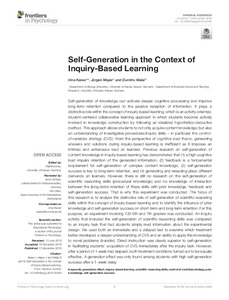| dc.date.accessioned | 2019-02-05T13:07:19Z | |
| dc.date.available | 2019-02-05T13:07:19Z | |
| dc.date.issued | 2018-12-13 | |
| dc.identifier | doi:10.17170/kobra-20190204149 | |
| dc.identifier.uri | http://hdl.handle.net/123456789/11064 | |
| dc.description.sponsorship | Gefördert durch den Publikationsfonds der Universität Kassel | |
| dc.language.iso | eng | |
| dc.rights | Urheberrechtlich geschützt | |
| dc.rights.uri | https://rightsstatements.org/page/InC/1.0/ | |
| dc.subject | generation effect | eng |
| dc.subject | inquiry-based learning | eng |
| dc.subject | scientific reasoning skills | eng |
| dc.subject | control of variables strategy | eng |
| dc.subject | prior knowledge | eng |
| dc.subject | self-generation success | eng |
| dc.subject.ddc | 570 | |
| dc.title | Self-Generation in the Context of Inquiry-Based Learning | eng |
| dc.type | Aufsatz | |
| dcterms.abstract | Self-generation of knowledge can activate deeper cognitive processing and improve long-term retention compared to the passive reception of information. It plays a distinctive role within the concept of inquiry-based learning, which is an activity-oriented, student-centered collaborative learning approach in which students become actively involved in knowledge construction by following an idealized hypothetico-deductive method. This approach allows students to not only acquire content knowledge, but also an understanding of investigative procedures/inquiry skills – in particular the control-of-variables strategy (CVS). From the perspective of cognitive load theory, generating answers and solutions during inquiry-based learning is inefficient as it imposes an intrinsic and extraneous load on learners. Previous research on self-generation of content knowledge in inquiry-based learning has demonstrated that (1) a high cognitive load impairs retention of the generated information, (2) feedback is a fundamental requirement for self-generation of complex content knowledge, (3) self-generation success is key to long-term retention, and (4) generating and rereading place different demands on learners. However, there is still no research on the self-generation of scientific reasoning skills (procedural knowledge) and no knowledge of interaction between the (long-term) retention of these skills with prior knowledge, feedback and self-generation success. That is why this experiment was conducted. The focus of this research is to analyze the distinctive role of self-generation of scientific reasoning skills within the concept of inquiry-based learning and to identify the influence of prior knowledge and self-generation success on short-term and long-term retention. For this purpose, an experiment involving 133 6th and 7th graders was conducted. An inquiry activity that included the self-generation of scientific reasoning skills was compared to an inquiry task that had students simply read information about the experimental design. We used both an immediate and a delayed test to examine which treatment better developed a deeper understanding of CVS and an ability to apply this knowledge to novel problems (transfer). Direct instruction was clearly superior to self-generation in facilitating students’ acquisition of CVS immediately after the inquiry task. However, after a period of 1 week had elapsed, both treatment conditions turned out to be equally effective. A generation effect was only found among students with high self-generation success after a 1-week delay. | eng |
| dcterms.accessRights | open access | |
| dcterms.creator | Kaiser, Irina | |
| dcterms.creator | Mayer, Jürgen | |
| dcterms.creator | Malai, Dumitru | |
| dc.relation.doi | doi:10.3389/fpsyg.2018.02440 | |
| dc.type.version | publishedVersion | |
| dcterms.source.identifier | ISSN 1664-1078 | |
| dcterms.source.journal | Frontiers in Psychology | |
| dcterms.source.pageinfo | 2440 | |
| dcterms.source.volume | 2018, 9 | |

